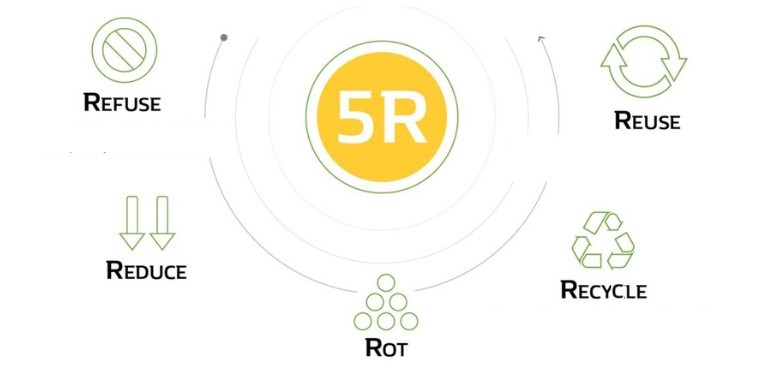The 6Rs: the path to a sustainable lifestyle and environmental protection.

The 6Rs ( Refuse, Reduce, Reuse, Repair, Recycle, Rot)
In the face of growing problems related to environmental degradation and growing challenges related to public health, the 6R principle becomes necessary. However, what exactly is it? What's behind this name? These six "R's" stand for Refuse, Reduce, Reuse, Repair, Recycle, and Rot - principles that can help achieve a more sustainable lifestyle, both for today's generation and for the planet. The 6R principle is a list of six actions that aim to minimize the negative impact on the natural environment by reducing the amount of products used and using them in a way that allows for repeated use.
Refuse – Rejection The first rule known as the 6Rs is Refuse.
This involves consciously choosing to refuse unnecessary items or services. Rejecting unnecessary goods can help reduce the amount of waste produced by individuals. By acting on this principle, consumers can avoid purchasing unnecessary packaging, disposable products and other items that contribute to excessive consumption and environmental pollution. For example, single-use plastics are a major source of waste, which can be easily disposed of by choosing reusable alternatives such as cloth bags or water bottles. You can refuse single-use plastic packaging or bags that are used only once and then thrown away. Instead, it is worth reaching for ecological alternatives.
Reduce – Limiting Another important issue is Reduce.
It involves striving to reduce the consumption and production of excess products and waste. Reducing your consumption may include stopping frequent use of cars, reducing energy consumption, or reducing the amount of food you throw away. Reducing is a key aspect of caring for the environment because it helps reduce the negative impact of consumerism on the planet. Therefore, purchasing products made from renewable materials or purchasing reusable items can have a positive impact on reducing their overall consumption on a global scale. It is worth paying attention only to those things that are actually needed. You can, for example, avoid mass products and instead choose higher quality products that will last longer.
Reuse
The Reuse principle encourages the use of items and products for as long as possible, rather than throwing them away after one use. Good reuse practices include repairing damaged items, donating used items to others, or turning them into new products. This approach helps reduce waste and extends the life cycle of products. Appropriate examples could be old clothes refurbished to give them a second life or donated to charity instead of thrown away. Practicing Reuse can bring many benefits to every pocket as well as the environment. Buying new items can be harmful to the climate because each individual product requires the consumption of raw materials and energy, as well as emissions of heat gases and carbon dioxide.
Repair
Repair means repairing damaged or worn items instead of replacing them with new ones. By following this principle, you can reduce waste and save natural resources. Repairing equipment, clothes or other items can be more ecological and economical than throwing them away. Preserving spoiled products is a key element of the 6Rs, which aim to reduce waste and protect the environment. Nowadays, when consumerism has reached its peak of popularity, more and more people are beginning to realize the need to take care of the planet and reduce waste production for the sake of overall well-being.
Recycling
The fifth principle of the 6R is Recycle. It involves processing waste such as plastic, glass or paper in order to reuse these raw materials. Recycling helps reduce the amount of waste sent to landfills and reduces the consumption of natural resources. This is important for environmental protection and resource conservation. Moreover, recycling is extremely popular nowadays. Many companies use this type of pro-environmental activities, including in marketing. Such projects are considered an important element of climate protection activities.
Rot – Composting
The last 6R rule, Rot, refers to composting organic waste, such as food scraps or plants. By composting, you can transform this waste into valuable fertilizer for plants, thus reducing wastereduce the amount of organic waste going to landfills. Composting is an example of a sustainable and ecological approach to waste management. The 6R principle is an approach that promotes a conscious and ecological approach to consumption and waste management. By acting in accordance with these principles, you can reduce your negative impact on the environment and help protect the planet for future generations.
